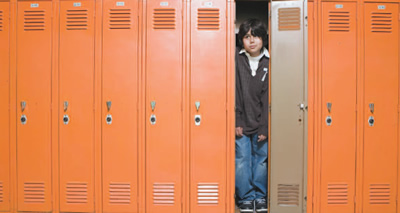 |
|
The transitions to middle and high school can seem daunting—to both children and parents. New middle and high schoolers enter a larger school and must deal with a larger number of new peers, new teachers and new subjects than they’re accustomed to, as well as become the youngest in the school—again. Parents hope their kids feel accepted by peers and teachers, earn high scores, meet great friends and make good decisions. And these challenges of transitioning are compounded by relocation to a new city as well. Some stress will always accompany the move to middle and high school, but there should be excitement, too, as the change also means new friends, new extracurricular activities, lockers and more freedom in the hallways. Parents, rest assured—there are ways to make the transition easier, for both you and your child.
According to the U.S. Department of Education, parents feel they can become less involved with school as their children get older, when parental involvement actually becomes more important at this time. Research has shown that involvement results in fewer absences, improved behavior and social skills, higher grades and test scores, and an increase in self-esteem and motivation. And according to the National Education Association, an organization dedicated to improving the country’s education system, students’ grades typically drop when they enter middle school, and freshmen in high school are more likely to drop out than their older peers. Clearly, it’s important to help ease this transition for your child. And one of the keys to a more successful transition is to be involved and communicate openly with the school and your child.
To help your child transition into middle or high school, you must understand what concerns they have. According to the National Middle School Association, the only national education association dedicated solely to the educational and developmental needs of middle schoolers, the main concerns of new middle school students include getting to class on time, getting lost, making failing grades, having more challenging work, being picked on and taking tests. As these students transition into high school, their concerns change somewhat: getting good grades, taking tests/final exams, taking difficult classes, preparing for college and turning in work on time. However, these concerns may not apply to all children. Your child may be more concerned about what you expect from him or her, making friends, peer pressure or getting into trouble. Discuss the transition with your child and ask how he or she feels about the change (excited, stressed, anxious) so that you can better understand what worries he or she has.
Perhaps one of the best ways to help alleviate some of your child’s fears about the transition is to make sure you and your child are familiar with the school and its transition resources. Most schools host an orientation/open house for students, which is particularly helpful to sixth- and ninth-graders. Some high schools even offer a freshman orientation for students entering the ninth grade. Orientations and open houses typically allow students to meet teachers and other students, get a copy of their class schedule, and, most important, familiarize themselves with their new surroundings. Getting to know teachers and other students helps ensure that your child will see at least one person he or she knows on the first day. Because students typically have one teacher and one classroom before entering middle or high school, having classes with more than one teacher in various rooms can be a confusing concept. Students who receive their class schedules at orientation should walk from class to class, if possible, so they feel more comfortable on the first day of school. Locating the lunch room, gym and restrooms may also help reduce first-day stress. Orientation also is a great place to practice opening a locker if your child receives his or her locker assignment. In addition to hosting orientations, some schools may also mail information packets to families, which may include materials about peer pressure and middle/ high school expectations, a student handbook and what to expect the first day of school. Be sure to speak with school administrators about options that will allow you and your child to learn more about the school. For example, middle and high schools usually offer more extracurricular activities, from drama to lacrosse, which allow your child to make friends and explore new interests—so find out as much as possible about the school.
If your child has started middle or high school this school year, then he or she has likely already attended an open house or orientation. However, transitioning is not an event, but a process that your child experiences beyond the first day of school. And there are additional ways to help ensure that this transition process continues to be a successful one. Many middle and high schools offer programs that pair an incoming sixth- or ninth-grader with an older student in the school who is available to answer any questions or concerns that the younger student may have. Typically, the older student helps with navigating the school, including finding classes, the lunch room or the gym, opening lockers, etc. But at the very least, this peer mentoring gives younger students the comfort of knowing that they have someone at the school to turn to during their time of transition. Similar to peer mentoring is teacher mentoring. A sixth- or ninth-grader is assigned to a teacher who answers questions and provides assistance. Some schools also offer Q & A sessions, where students typically meet in small groups and ask administrators or older students questions relating to the transition experience. Another valuable transition resource for students throughout the year is the school counselor, whose job is to help students with academic, career and personal objectives. Make sure your child takes advantage of opportunities to meet the counselor—at open houses, orientations or other school visits. Most important, if your child has any questions during the transition year, he or she should know who to ask—an older student, a teacher, a counselor or a school administrator.
In addition to ensuring that your children succeed socially during their first year as a middle or high schooler, you should also help ensure that they succeed academically. Schoolwork will be a bit more challenging than it was in prior years. In elementary school, your child was likely graded on a check system (check-plus, check, check-minus) or a satisfactory/unsatisfactory system. The move to middle school typically means grading will be done on an A-B-C scale (A+, A, A-, B+, etc.) or 100-point scale (scores in the 90s are typically As; scores in the 80s are Bs; 70s are Cs, etc.). If students are not exposed to the 100-point scale in middle school, then they may experience it when they enter high school. But regardless of whether your child experiences a new grading system, the grading and assignmentswill be tougher, as more is expected academically of students at these grade levels. Be sure to meet with your child’s new teachers before the start of the school year or in the beginning of the year to find out what these new expectations and grading policies are. Also, ask about homework—will your child have homework nightly; how much time will he or she be expected to spend on homework; will the homework be graded for accuracy, or will the teacher just check to make sure it was completed? Of course, share the information with your child—the more information he or she has about expectations at the new school, the more at ease he or she will feel. High school students should be encouraged to think about what they want to do after high school—if attending college, they need to choose classes, such as college prep, advanced placement, etc., that will help them reach their goal. School counselors are a great resource for helping students prepare for life after high school.
|  |
|
|
Continue to meet regularly with the teachers throughout the year to track your child’s academic progress. Because of the research that suggests students’ grades drop when they enter middle school and ninth-graders have a higher risk than older students for dropping out, a smooth transition to middle and high school is critical to your child’s future academic success. High schoolers who plan to attend college will need to maintain good grades to attend the schools of their choice. Thus, it’s important to know how your child is doing in school so you can provide the assistance he or she may need. Along with parent-teacher conferences, many Metro Atlanta schools offer online programs where parents and students can monitor grades. Ask school administrators what options are available for tracking your child’s progress. Discuss any academic issues with a teacher as soon as possible. Your child may need more assistance in school, a bit more help at home or tutoring.
Because your new middle or high schooler will have classes that are more challenging and more assignments to complete, organization and time-management skills will be critical to a successful transition. Students entering middle and high school are expected to be more responsible academically, so if your child fails to complete an assignment on time, the result may be poor grades. A different colored notebook for each class may help improve organization. Also, sit down with your child, look at his or her assignments and help your child create a schedule. Don’t hesitate to ask your child if an assignment has been completed. If you ask middle schoolers now, then you should need to ask less when they enter high school. Additionally, your child’s teachers understand that the transition to middle or high school can be difficult, so if your child is feeling overwhelmed by the amount of schoolwork, discuss this with them. They may be able to help your child better organize his or her assignments. For high schoolers who attend college, time-management and organization skills will be needed to juggle even more difficult classes and assignments.
Transitioning to middle and high school certainly can be difficult for both parents and children—especially when combining this transition with a move to a new city. But by being involved and communicating with both the school and your child, the transition may indeed be easier.